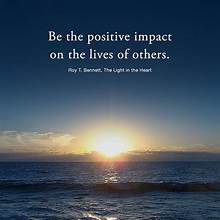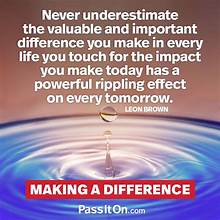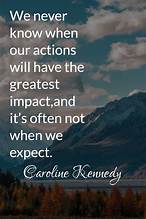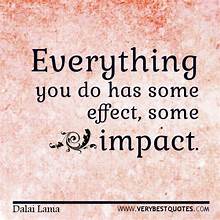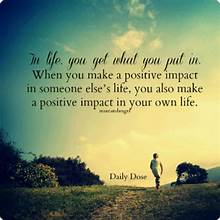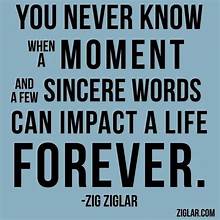One of my all-time favorite classic movies is Good Morning, Miss Dove. This film, made in 1955, is about a schoolteacher and the reflections she has on her life and former students. These reflections take place while Miss Dove is in the hospital and are triggered by former students who work at the hospital or who come to visit her upon hearing the news of her hospitalization. A commonality among all her former students’ comments is the positive influence Miss Dove had on their lives.
Shortly after watching the movie, I came across the following story which echoed the theme the movie – never underestimate the impact we have on others:
When I was quite young, my father had one of the first telephones in our neighborhood. I remember well the polished old case fastened to the wall. The shiny receiver hung on the side of the wooden box. I was too little to reach the telephone, but would listen with fascination when my mother talked to it.
I came to realize that somewhere inside the wonderful device lived an amazing person with the name “Information Please,” and there was nothing she did not know. I overheard my father saying to my mother that “Information Please” could supply anybody’s number and even give you the correct time of the day.
My first personal experience with this “genie-in-the-bottle” came one day while dad was at work and my mother was visiting a neighbor. Amusing myself at the tool bench in the basement, I whacked my finger with a hammer. The pain was terrible, but there didn’t seem to be any reason for crying because there was no one at home to give me sympathy. I walked around the house sucking my throbbing finger. Finally, arriving at the stairway, I saw…the telephone!
Quickly I ran for the footstool in the parlor and dragged it to the landing. Climbing up, I unhooked the receiver and held it to my ear. “Information Please!” I spoke desperately into the mouthpiece just above my head. A click or two later, a small, clear voice spoke into my ear: “Information,” she answered.
“I hurt my finger…” I wailed into the phone. The tears came readily enough now that I had an audience.
“Isn’t your mother home?” came the question.
“Nobody’s home but me,” I blubbered.
“Are you bleeding?”
“No,” I replied. “I hit my finger with the hammer and it hurts.”
“Can you open your icebox?” she asked. I said I could. “Then chip off a little piece of ice and hold it to your finger,” said the voice.
I did what she said and my finger stopped hurting!
After that, I called “Information Please” for everything. I asked her for help with my geography, and she told me where Philadelphia was located. She helped me with my math. She told me that my pet chipmunk, which I had caught in the park just the day before, would eat fruits and nuts.
Then, there was the time when Petey, our pet canary, died. I called “Information” and told her the sad story. She listened then said the usual things grown-ups say to soothe a child. But I was unconsoled. I asked her, “Why is it that birdies should sing so beautifully and bring joy to all families, only to end up in a heap?” She must have sensed my deep concern, for she said quietly, “Paul, always remember that there is another world to sing in.” Somehow, I felt better.
Another day I was on the telephone again. “Information please,” I spoke into the receiver.
“Information,” said the now familiar voice.
“How do you spell ‘fix’?” I queried.
All of these conversations took place on the phone in my childhood home in a small town in the Pacific Northwest.
When I was 9 years old, we moved across the country to Boston. I missed my friend very much. I longed to say, “Information Please,” into that old wooden box back home, and somehow I never thought of trying the tall, shiny new phone that sat on the table in the hall.
As I grew into my teens, the memories of those childhood conversations never really left me. Often, in the moments of doubt and perplexity I would recall the serene sense of security I had then. I appreciated now how patient, understanding, and kind she was to have spent her time on a little boy.
A few years later, on my way west to college, I had to stop at the airport in Seattle. I had a half hour or so between planes. I spent 15 minutes on the phone with my sister, who lived there now. Then, out of the blue, I decided to dial my hometown operator and found myself saying, “Information Please.”
Miraculously, I heard the small, clear voice I knew so well. “Information,” she replied.” I hadn’t planned this, but heard myself saying, “Could you please tell me how to spell, ‘fix’?”
There was a long pause. Then came the soft-spoken answer, “I guess your finger must have healed by now.”
I laughed. “So it’s really still you,” I said. “I wonder if you have any idea how much you meant to me during that time.”
“I wonder,” she said, “if you know how much your calls meant to me. I never had any children, and I used to look forward to your calls.”
I told her how often I had thought of her over the years and I asked if I could call her again when I came back to visit my sister. “Please do,” she said. “Just ask for Sally.”
Three months later I was back in Seattle. A different voice answered, “Information.” I asked for Sally. “Are you a friend?” she asked.
“Yes, a very old friend,” I answered.
“I’m sorry to have to tell you this,” she said. “Sally had been working part time the last few years because she was sick. She died five weeks ago.” Before I could hang up she said, “Wait a minute. Did you say your name was Paul?”
“Yes.”
“Well, Sally left a message for you. She wrote it down in case you called. Let me read it to you. The note says, ‘Tell him I still say there is another world to sing in. He’ll know what I mean.'”
I thanked her and hung up the phone. I knew what Sally meant.
Both Miss Dove and “Information Please” (aka Sally) took time to be helpful, caring, and kind when the opportunity to do so presented itself. What may seem small or insignificant to us may have a huge impact on others. Every day we make lifelong impressions on others. As Jane Goodall (English primatologist and anthropologist) said, “You cannot get through a single day without having an impact on the world around you. What you do makes a difference, and you have to decide what kind of difference you want to make.” Indeed, it is our choice as to what kind of difference we make. We should ensure that our words and deeds leave impressions that are meaningful and helpful so the difference we make in the world is a positive one.
